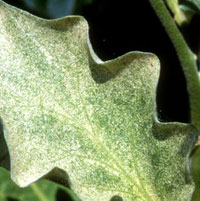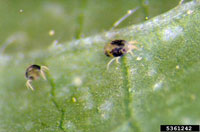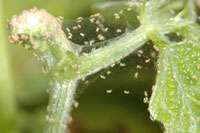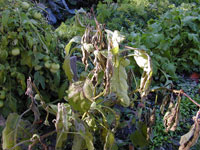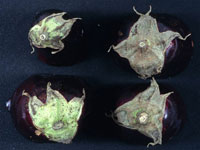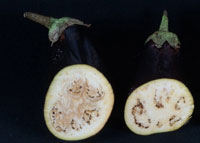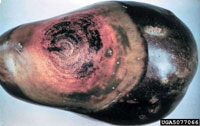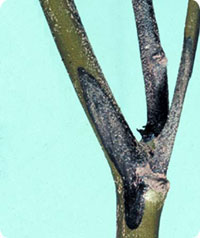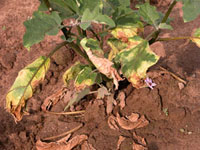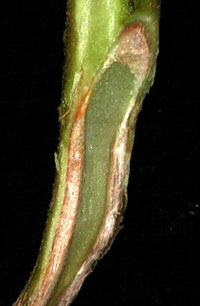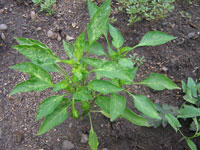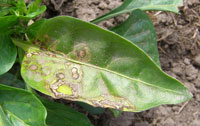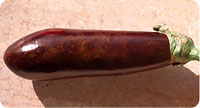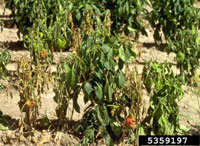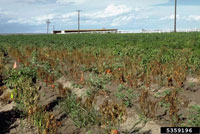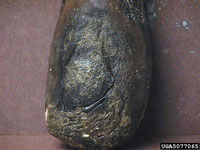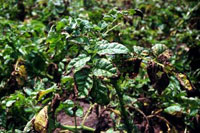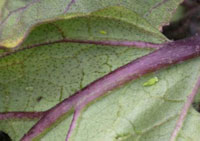Extension > Garden > Diagnose a problem > What's wrong with my plant? > Vegetable > Eggplant > Discolored leaves
Eggplant > Leaves > Discolored leaves
1 of 7
Two-spotted Spider Mite
Tetranychus urticae
- Feeding on the underside of leaves causes a "russet" appearance to the leaves; leaves may become distorted
- In heavy infestations, webbing can be found on underside of leaves
- Adult spider mites are very small (approximately 1/50 inch in length), and are yellow to dark crimson, with dark spots
- In heavy infestations, mites can be seen crawling on eggplant fruit
- Mites usually appear in late June-August; more prevalent in hot, dry weather
- More information on Two-spotted Spider Mite
2 of 7
Frost Damage/Chilling Injury
- Leaves look water-soaked and soft, then turn black
- Surface of fruit appears bronzed
- Seeds and inside of fruit are brown
- Fruit becomes soft water-soaked and rots
- Leaves show injury immediately, fruit may not show symptoms for 5 to 7 days
- Eggplant is more sensitive to cold than tomatoes and peppers
3 of 7
Phomopsis Blight
Phomopsis vexans
- Stems develop dark sunken lesions just above the soil line
- Seedlings may collapse and die
- Leaves develop circular, gray to brown lesions with a light center
- Severely infected leaves become torn, yellow, wilt and drop
- Fruit develops pale, sunken, oval spots
- Concentric rings of tiny black dots can be seen in fruit infection
- More information on Phomopsis Blight
4 of 7
Verticillium Wilt
Verticillium spp.
- Leaf edges and tips turn yellow
- Eventually entire leaves yellow and wilt
- Symptoms often affect one side only
- Lower leaves wilt first, eventually whole plant wilts
- In a lengthwise cut of the stem near the soil line, veins are tan, center is green
- More information on growing healthy vegetables
5 of 7
Virus
Cucumber mosaic virus and others
- Leaves are mottled with yellow and light green patches
- Leaves are misshapen; unusually long and thin like a shoestring or curled and deformed
- Fruit have yellow blotches or brown rings
- Plants may be stunted
- More information on growing healthy vegetables
6 of 7
Phytophthora Blight
Phytophthora capsici and Phytophthora parasitica
- Entire plant wilts and turns brown
- Soft, dark, water soaked spots form on fruit
- Water soaked to tan bleached spots may form on leaves
- Fruit wither but remain attached and become coated in white fungal growth
- Dark sunken spots form on stems, all leaves beyond this spot wilt
- Disease spreads very rapidly in cool wet weather
- More information on growing healthy vegetables
7 of 7
Potato Leafhopper
Empoasca fabae
- Leaves appear wrinkled from leafhopper feeding; may have a yellow tinge to the leaves
- Adults are yellow green, slender, small (1/8 inch long), and wedge-shaped
- Potato leafhoppers are present from June-August
- More information on Potato Leafhopper



